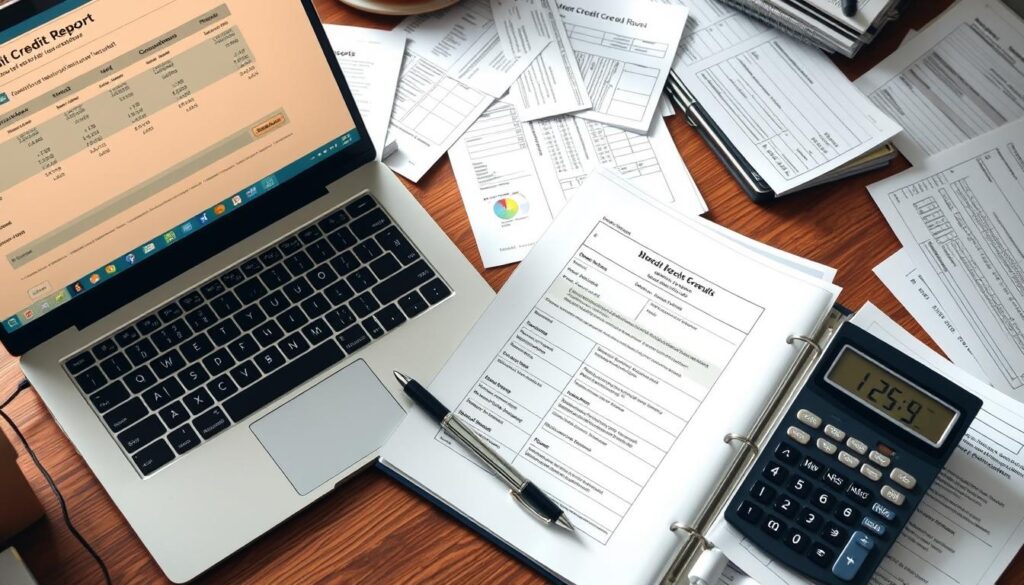Managing your credit can be challenging. Knowing how to contact Experian, Equifax, and TransUnion is crucial for your financial health. This guide offers key information to help you handle credit issues effectively.
You’ll learn how to dispute errors on your credit report. We’ll also cover steps to protect yourself from identity theft. With this knowledge, you can take charge of your financial future.
Key Takeaways
- The three major credit reporting bureaus are Experian, Equifax, and TransUnion.
- Learn how to contact each bureau for credit report disputes, fraud alerts, and more.
- Understand the importance of regularly monitoring your credit reports and taking steps to protect your identity.
- Discover resources and services to help you manage your credit and stay informed about your financial well-being.
- Familiarize yourself with the various ways to reach out to the credit bureaus, including phone, mail, and online methods.
Understanding the Three Major Credit Reporting Bureaus
Experian, Equifax, and TransUnion are the backbone of the U.S. credit system. These organizations collect and maintain detailed information about consumers’ credit histories. Their data is used to create credit reports and scores.
Managing your personal credit requires understanding these three credit bureaus. Each plays a unique role in shaping your financial profile. Let’s explore what sets them apart.
Experian
Experian is a leader among the three credit reporting bureaus. It’s known for its thorough credit reports. The company gathers data from various sources to create detailed credit profiles.
These sources include credit card companies, lenders, and public records. This wide range of information helps paint a complete picture of your credit history.
Equifax
Equifax is another giant in the credit reporting world. It holds credit information on over 800 million consumers worldwide. The company uses advanced tech to generate credit scores and reports.
These tools help lenders and creditors make smart decisions. Equifax’s global reach makes it a key player in the industry.
TransUnion
TransUnion is the third major credit reporting bureau. It offers detailed credit reports and scoring to consumers and businesses. The company’s huge database includes info from many sources.
This allows TransUnion to provide a well-rounded view of your credit history. Their reports can give you a clear picture of your financial standing.
| Credit Bureau | Key Features | Contact Information |
|---|---|---|
| Experian | Comprehensive credit reports, advanced analytics | Phone: 1-888-397-3742 Website: www.experian.com |
| Equifax | Global credit data, innovative credit scoring | Phone: 1-888-766-0008 Website: www.equifax.com |
| TransUnion | Extensive consumer credit information, customized reports | Phone: 1-800-888-4213 Website: www.transunion.com |
Knowing the strengths of each credit bureau can help you manage your finances better. You can make smarter choices about credit monitoring services and credit score inquiries.
This knowledge empowers you to take control of your credit profile. It’s a key step in maintaining a healthy financial future.
Why You Need to Contact Credit Bureaus
A healthy credit score is vital for your finances. Checking your credit report regularly is key. You may need to contact credit bureaus for various reasons.
Disputing errors on your credit report is a top reason. Inaccuracies can hurt your credit score inquiries. They can make getting loans, credit cards, or housing harder.
Contact credit bureaus if you suspect identity theft. Set up a fraud alert or credit freeze. This helps prevent unauthorized access to your credit info.
Regular credit report reviews protect your financial future. They ensure your credit score inquiries show your true creditworthiness. Understanding why to contact credit bureaus helps you guard against threats.
| Reason to Contact Credit Bureaus | Potential Consequences |
|---|---|
| Disputing Inaccuracies on Credit Report | Negative impact on credit score, difficulty obtaining loans, credit cards, or housing/employment |
| Suspicion of Identity Theft | Unauthorized access to credit information, potential financial and legal consequences |
Regularly contact credit bureaus to keep your credit report accurate. This protects you from financial and legal issues.

“Monitoring your credit report and addressing any issues promptly is essential for maintaining a healthy financial future.”
Disputing Errors on Your Credit Report
Credit report mistakes can hurt your financial future. They may stop you from getting loans, credit cards, or housing. You can fight these errors with the credit bureaus.
The credit report dispute process might seem hard. But with the right steps, you can fix credit report errors and boost your money situation.
How to File a Dispute
First, find which credit bureau shows the error. Then, follow these steps to start the dispute process:
- Get a copy of your credit report from the bureau with the error.
- Check the report and spot the wrong info.
- Collect proof that shows the error, like receipts or letters from creditors.
- Contact the credit bureau by phone, mail, or online. Send your credit report dispute with evidence.
- Check on your dispute’s progress. Make sure the bureau fixes the issue on time.
Supporting Documentation
When disputing credit report errors, you need good proof. This can include:
- Copies of bills or receipts that show the right info
- Letters from creditors that prove the mistake
- ID proof, like a driver’s license or passport
- Any other papers that back up your claim
Follow the credit report dispute steps carefully. Provide strong supporting documentation. This will help fix credit report errors and improve your money outlook.
Requesting Your Free Annual Credit Report
You can get free credit reports from Experian, Equifax, and TransUnion once a year. These reports help you check your credit info and spot potential issues.
The Federal Trade Commission set up AnnualCreditReport.com for this purpose. It’s the only official site to get your free annual credit report.
Here’s how to get your free annual credit report:
- Visit AnnualCreditReport.com and click on the “Request your free credit reports” button.
- Follow the on-screen instructions to provide the necessary information, such as your name, address, and Social Security number, to verify your identity.
- Select the credit bureau(s) from which you want to receive your free annual credit report.
- Review your credit report(s) carefully for any inaccuracies or fraudulent activity, and be prepared to dispute any errors you find.
Regular credit report checks are key to a healthy financial profile. They help you spot and fix issues quickly.

Credit monitoring services offer year-round protection. They can guard against identity theft and give you peace of mind.
Placing a Fraud Alert or Credit Freeze
Identity theft is a growing concern in today’s digital age. Protect your financial information by placing a fraud alert or credit freeze. These steps safeguard your credit from potential thieves.
Fraud Alert
A fraud alert is a free tool that notifies creditors to verify your identity. It’s used before approving new credit applications in your name. Contact one of the three major credit bureaus to initiate a fraud alert.
The bureau you contact will notify the other two on your behalf. A fraud alert typically lasts for one year and can be renewed.
- A fraud alert typically lasts for one year and can be renewed.
- It’s important to monitor your credit reports regularly and report any suspicious activity to the credit bureaus.
Credit Freeze
A credit freeze, or security freeze, is a more comprehensive measure. It prevents identity thieves from opening new accounts in your name. Credit bureaus restrict access to your credit report when you place a freeze.
To initiate a credit freeze, contact each of the three credit bureaus individually. A credit freeze remains in effect until you choose to lift it.
- To initiate a credit freeze, you’ll need to contact each of the three credit bureaus individually.
- A credit freeze remains in effect until you choose to lift it, providing you with greater control over who can access your credit information.
- While a credit freeze is free, there may be a small fee to temporarily lift the freeze when you need to apply for new credit.
Understanding these protective measures can help reduce the risk of fraud. Implementing them safeguards against fraud alert, identity theft, and credit bureau contact issues.
“Protecting your credit is one of the best ways to safeguard your financial future.”
Experian Contact Information
Experian is a major credit bureau in the United States. It manages and maintains consumers’ credit information. Here’s how to contact Experian for credit-related inquiries or disputes.
Experian offers multiple ways to assist you. You can dispute errors, request credit reports, or inquire about other services.
Experian Contact Options
- Mailing Address: Experian, P.O. Box 4500, Allen, TX 75013
- Phone Number: 1-888-397-3742 (for credit report and credit score inquiries)
- Fax: 1-800-301-7196 (for credit report disputes)
- Online: Visit Experian.com to access a wide range of credit bureau services, including credit report requests, dispute submissions, and more.
When contacting Experian, have all necessary information ready. This ensures a smooth process for disputing errors or requesting credit reports.

“Maintaining accurate credit information is crucial for your financial well-being. That’s why it’s important to stay informed and proactive when it comes to managing your credit bureau interactions.”
Knowing Experian’s contact options helps you manage your credit. You can take control of your financial future this way.
Equifax Contact Information
Credit reports and disputes can be complex. Having the right contact info for major credit bureaus is essential. Let’s look at how to reach Equifax, a leading U.S. credit reporting agency.
To file a credit report dispute with Equifax, use this mailing address:
- Equifax Information Services LLC
- P.O. Box 740256
- Atlanta, GA 30374-0256
For general inquiries or to request your Equifax credit report, contact their customer service team:
| Phone Number | Hours |
|---|---|
| 1-888-685-1111 | Monday – Friday, 8 AM to 8 PM EST |
If you suspect identity theft or need a fraud alert, reach out to their fraud department:
- Phone: 1-888-766-0008
- Hours: 24 hours a day, 7 days a week
For info on credit freezes or monitoring services, visit www.equifax.com. This website offers additional resources to help manage your credit.
Knowing your credit bureau phone numbers is crucial. Effective communication with agencies like Equifax helps maintain a healthy credit profile. It also aids in resolving any issues that may come up.
TransUnion Contact Information
Managing your credit involves contacting credit reporting bureaus. TransUnion is a major credit bureau you may need to reach. You might contact them for disputes, credit report inquiries, or other credit-related matters.
Here’s how to get in touch with TransUnion:
By Mail
- TransUnion Consumer Solutions
P.O. Box 2000
Chester, PA 19022-2000
By Phone
- General Inquiries: 1-800-888-4213
- Credit Report Dispute Contact: 1-800-916-8800
- Fraud Victim Assistance: 1-800-680-7289
Online
- Website: www.transunion.com
- Dispute Center: www.transunion.com/credit-dispute
Your credit health is vital. Knowing how to contact TransUnion helps ensure your credit report’s accuracy. It also protects your financial well-being.
| TransUnion Contact Information | Details |
|---|---|
| Mailing Address | TransUnion Consumer Solutions P.O. Box 2000 Chester, PA 19022-2000 |
| General Inquiries Phone Number | 1-800-888-4213 |
| Credit Report Dispute Contact | 1-800-916-8800 |
| Fraud Victim Assistance Phone Number | 1-800-680-7289 |
| Website | www.transunion.com |
| Dispute Center | www.transunion.com/credit-dispute |
Keep this TransUnion contact info handy. It’ll help you address credit issues quickly. You can stay in control of your financial health.
three credit reporting bureaus contact info
Understanding how to reach the major credit reporting bureaus is vital for managing your financial health. Experian, Equifax, and TransUnion play crucial roles in your credit journey. Having their contact details handy can help you address issues quickly and effectively.
You might need to dispute errors, request free annual credit reports, or place fraud alerts. In such cases, knowing how to reach these bureaus becomes invaluable. Quick access to their information can make a significant difference in resolving credit-related concerns.
| Credit Bureau | Contact Information |
|---|---|
| Experian |
|
| Equifax |
|
| TransUnion |
|
Keep this three credit reporting bureaus contact info handy for easy access. It empowers you to manage your credit proactively and tackle any issues promptly. By staying informed, you can ensure your financial future remains on a positive track.
Tips for Effective Communication with Credit Bureaus
Talking to credit bureaus is vital when fixing credit report errors. These tips will help you handle inquiries and disputes efficiently.
Be Prepared
Gather all necessary information and documents before contacting credit bureaus. This includes your full name, address, and Social Security number. Have details about any credit report issues ready.
Being prepared will make the credit bureau communication process smoother. It also increases your chances of solving the problem.
Follow Up
Stay persistent during the credit report dispute process. Follow up regularly after submitting your inquiry or dispute. Make sure your case is being processed.
Address any requests for more information promptly. Keep detailed records of all communications. This helps track progress and hold credit bureaus accountable.
These tips will help you navigate credit bureau communication effectively. Taking action on credit issues can improve your financial health.
It can also boost the effectiveness of your credit monitoring services. Remember, being proactive about your credit is key.

Credit Monitoring and Identity Theft Protection Services
Credit monitoring services and identity theft protection solutions help safeguard your credit information. They offer features to boost your credit health and personal data security.
Credit monitoring lets you review reports from Experian, Equifax, and TransUnion. This helps you spot errors or suspicious activity on your credit profile.
Many services provide real-time alerts for changes to your credit file. They also assist in resolving identity theft incidents if they happen.
- Regularly monitor your credit score inquiries to ensure no unauthorized access to your credit information
- Receive alerts for any changes to your credit report, such as new accounts, address updates, or suspicious activity
- Gain access to credit report monitoring and identity restoration services in the event of identity theft
These services help protect your financial well-being and personal information. They give you more control over your credit journey.
Investing in these services can bring peace of mind. It’s a smart step in safeguarding your financial future.
“Protecting your credit and identity is crucial in today’s digital landscape. Credit monitoring services can be a valuable tool in this ongoing effort.”
Additional Resources for Credit-Related Matters
Managing consumer credit can be tough. Luckily, many resources can help you handle finances and protect your credit score. These organizations offer assistance with credit report disputes, credit score inquiries, and consumer credit resources.
The Consumer Financial Protection Bureau (CFPB) is a key resource. It’s a government agency helping consumers make smart financial choices. Their website has guides on credit report disputes and consumer rights.
The Federal Trade Commission (FTC) provides info on credit reporting and identity theft. They offer steps to take if you’re a victim of fraud.
- The Federal Trade Commission (FTC) also provides comprehensive information on credit reporting and identity theft, including steps to take if you become a victim of fraud.
- Non-profit organizations like the National Foundation for Credit Counseling (NFCC) and the Consumer Credit Counseling Service (CCCS) offer free or low-cost credit counseling and debt management services to help individuals improve their financial health.
- For those seeking specialized assistance, the National Association of Consumer Advocates (NACA) maintains a directory of attorneys who specialize in consumer credit and debt-related issues.
Your credit health is vital. Taking steps to understand and manage it can greatly impact your finances. Use these resources to control your credit and secure a better financial future.
“Your credit report and score are essential components of your financial health. Keeping a close eye on them and taking action to address any issues can make a world of difference.”
Conclusion
Understanding credit bureau contact info is vital for managing your credit report. Experian, Equifax, and TransUnion offer key services for your financial well-being. You can dispute errors, place fraud alerts, and request free annual credit reports.
Effective communication with credit bureaus is crucial. Be prepared with necessary info and documents when reaching out. Follow up on issues to ensure they’re addressed quickly and correctly.
Proactive credit management is a powerful way to maintain financial health. It also helps safeguard your identity from potential threats. Use the resources provided to take control of your credit future.

